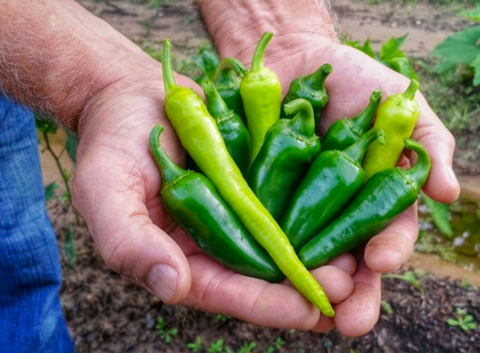
Have you always raised chickens and grown a garden?
I was brought up in the suburbs of Kansas City with my parents and grandparents planting a garden each summer. Though I didn’t have any interest in it as a child, I did learn the basics from watching my family tend the gardens. Once I was out on my own, I realized how much I missed that garden and started growing veggies and herbs wherever I could. I loved visiting farms as a girl, but was more interested in the horses. I never gave a thought to chickens!
What got you to start raising chickens?
We had my son’s 4th birthday party at a local dairy farm. They brought different farm animals  around for the kids to learn about and pet. My son would not put down the little red hen! He carried it all around! Only the promise of birthday cake distracted him from this hen. The little red hen and the instant bond with my son got me thinking about backyard chicken keeping. I started my research after the party. I read everything I could get my hands on about chicks and chicken keeping. It took about 5 years before I came to a place in life that I could execute this dream of a backyard coop. Everyone thought I was crazy. I met a wonderful guy who had previous chicken experience and better carpentry skills than I. He believed in my dream and helped make it happen!
around for the kids to learn about and pet. My son would not put down the little red hen! He carried it all around! Only the promise of birthday cake distracted him from this hen. The little red hen and the instant bond with my son got me thinking about backyard chicken keeping. I started my research after the party. I read everything I could get my hands on about chicks and chicken keeping. It took about 5 years before I came to a place in life that I could execute this dream of a backyard coop. Everyone thought I was crazy. I met a wonderful guy who had previous chicken experience and better carpentry skills than I. He believed in my dream and helped make it happen!

When you had your first set of baby chickens, how did you feel?
I was excited, scared to death and impatient all rolled into one! My dream was finally being realized. Please don’t die! When will I get my first egg? A twinge of these same feelings returns with each new batch of chicks, but now I have more experience.
To anyone else interested in raising chickens, what are some of the most important things you would like to have others understand?
If you are in an urban or suburban setting,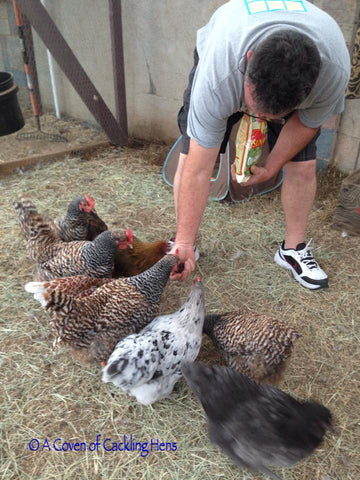 check your local laws. If you have a home owners association, check the rules. There is nothing worse than finding out, after investing time and money, that your hens are illegal. Also talk to and educate your neighbors! Don’t hide your chickens. Plus it is amazing how quickly minds change when offered a bribe of fresh eggs! Also, these are living, breathing, feeling creatures! With the rise of backyard chicken keeping, we are seeing a rise in abuse, neglect and abandonment of hens and especially roosters. This is a commitment! A hen lives 8-10 years on average and are typically only productive layers for 5-7 years. What are you going to do once a hen stops laying? You have to ask yourself the hard questions before taking on the responsibility of raising chickens.
check your local laws. If you have a home owners association, check the rules. There is nothing worse than finding out, after investing time and money, that your hens are illegal. Also talk to and educate your neighbors! Don’t hide your chickens. Plus it is amazing how quickly minds change when offered a bribe of fresh eggs! Also, these are living, breathing, feeling creatures! With the rise of backyard chicken keeping, we are seeing a rise in abuse, neglect and abandonment of hens and especially roosters. This is a commitment! A hen lives 8-10 years on average and are typically only productive layers for 5-7 years. What are you going to do once a hen stops laying? You have to ask yourself the hard questions before taking on the responsibility of raising chickens.
Is there something that people should definitely NOT do?
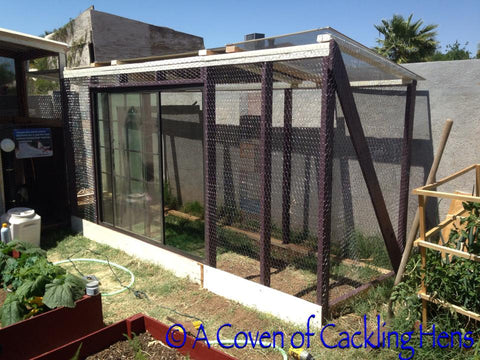 Do not underestimate how many chickens you will adopt and how much space they need. There is a quote going around “People thought I was crazy building a chicken coop. They were right, I should have built two!” Chickens are addictive (again, check your local laws as to how many chickens you are allowed)! I started of with a respectable size coop. Then I added a 4x10 run. And now I have a 10 ft x 20 ft protected chicken yard. All this is in addition to letting the girls free range in the afternoon and evening. A small hobby has turned into a chicken complex. Remember that overcrowding leads to bullying, feather picking and unsanitary conditions.
Do not underestimate how many chickens you will adopt and how much space they need. There is a quote going around “People thought I was crazy building a chicken coop. They were right, I should have built two!” Chickens are addictive (again, check your local laws as to how many chickens you are allowed)! I started of with a respectable size coop. Then I added a 4x10 run. And now I have a 10 ft x 20 ft protected chicken yard. All this is in addition to letting the girls free range in the afternoon and evening. A small hobby has turned into a chicken complex. Remember that overcrowding leads to bullying, feather picking and unsanitary conditions.
Is there something that people definitely should do?
ENJOY YOUR CHICKENS! Do they have safe shelter, balanced feed and fresh water? Stop worrying and enjoy them! New chicken keepers tend to obsess over every little thing. Chicken keeping is an ongoing learning experience. You aren’t going to get it perfect the first time. The fun of chicken keeping lies in getting to know your girls. Like people, chickens each have different personalities. What are their likes and dislikes? You adjust the environment to them.
What tips and tricks could you share with other people?
1. Consider your climate when buying/designing a coop. I live in the desert of Arizona. My coop is open on three sides to help keep it cool. My coop would not work for someone in Maine who deals with many feet of snow and frigid temperatures.
2. Learn your area predators and poisonous plants. Protect your flock.
3. Vinegar is your friend to safely and naturally clean the coop, waterers and feed dishes! And vinegar infused with citrus and herbs is even better!
4. Have a chicken first aid kit and references for treatment/avian vet phone number BEFORE something happens. (cotton balls, Q-tips, gauze pads, gloves, tweezers, eye dropper, vet wrap, Vetericyn spray, Blu-Kote, saline solution, epsom salt, an antibiotic ointment WITHOUT pain relief) Also
5. Join a local chicken group (either online or in person). The chicken community is full of amazing and helpful individuals!
6. Grow lots of herbs and edible flowers: cilantro, fennel, mints, lemon mint, lemon balm, lemon grass, marigold, lavender, nasturtiums, oregano, comfrey, borage, basil, dill, parsley, sage, thyme, wheat, garlic. Chickens love herbs, they improve the eggs and the health benefits are innumerable! (A good place to plug the All-in-one backyard chicken keeper variety pack)
7. Understand chicken bio-security. I keep shoes and clothes for my backyard only. This prevents me from bringing in or taking out possible contagions.
8. Vary chicken snacks according to the season. Oatmeal and scratch in the winter to keep them warm. Melons, berries and high water content veggies keep them cool and hydrated during the summer.
9. When it comes to feeding your chickens veggie and meat scraps, I ask myself “Would I eat it?” Something that is slightly over ripe or a bit stale is fine. Absolutely nothing with mold should be fed to your chickens. Also, chickens are omnivores, not vegetarians as many people think. While free ranging, they will eat insects, worms, mice and lizards. Scraps of lean meat are acceptable treats. Never feed potatoes, avocado, nightshade greenery (from tomatoes, potatoes, eggplant and rhubarb), dried beans and rice, onions, seeds and pits from apples, cherries, peaches, pears, plums and apricots.
10. Have a camera and many memory cards. Shhhh! I think I have more pictures of my chickens than my kids!
Have you ever made mistakes or failed doing something?
All the time! Giving the girls enough space was my biggest mistake in the beginning and something we immediately rectified. Right now I am finding out that my feeder is creating a lot of waste. While the food does end up in the compost, I’d much rather it go through the chicken first and then end up in the compost! Like I said before, it is constant tweaking to improve the quality of life for the girls and the easy of chicken keeping for me.

How did you overcome any obstacles?
Community support! There is an amazing online chicken community, both local and worldwide. There is always someone who has been keeping chickens longer than you and has been through what you are experiencing. The friends I have made are invaluable resources, plus are always there to lend an ear.
 Have you ever dealt with a person who disregards your life style?
Have you ever dealt with a person who disregards your life style?
I had a few friends who were tired of seeing chickens on my personal page and began to wonder about me. That’s how the chickens ended up with their own Facebook page. The only people I have had look down on me for raising chickens are not animal people to begin with. They don’t comprehend the love of a dog or cat, let alone a chicken. I can not imagine life without animal companions. If we stop and listen, they teach us so much!
What are some of your greatest rewards with a lifestyle such as the one you live?
Of course the amazing fresh eggs are the number one reward! 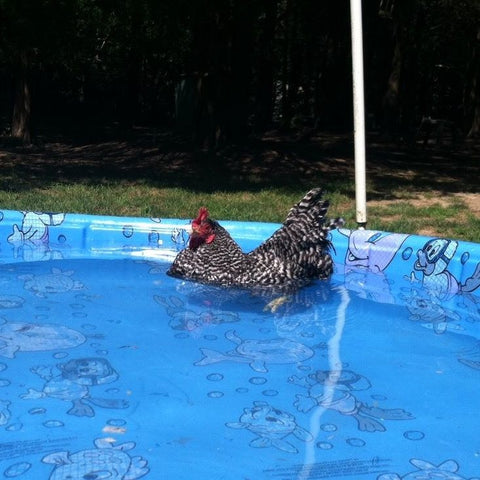 My suburban micro farm is a work in
My suburban micro farm is a work in
progress. My girls are one piece to the permaculture system I am attempting to establish. The chickens help out the garden: fertilizer, insect control, turning the dirt, mixing in compost. In turn, the garden helps the chickens: insects, garden scraps, dedicated chicken crops. Plus the garden and chickens contribute to the compost (poop and scraps), the chickens turn the compost and then the compost nourishes the soil. I also use the chicken pool water (yes, my chickens have a swimming pool of their own during our hot summers) to water my bananas, grapes and blackberries. The water has a very diluted amount of chicken manure that adds nitrogen to the soil. Finally, the garden feeds the family. I do the best I can to have a complete system. And hopefully my kids are learning valuable life skills by observing and helping out with the chickens and gardens. On a personal level, nothing grounds me more that sitting with my chickens. Watching them scratch around and do their chicken things is the best way to shake of a rough day. I will sit on the ground and hand feed raisins. I often end up with chickens on me! That is a reward I never expected from keeping chickens.

Interested in growing beneficial herbs for your backyard chickens?
]]>

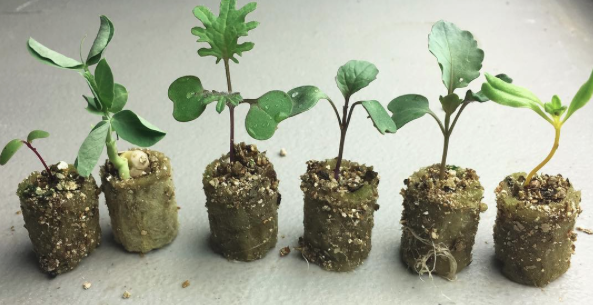


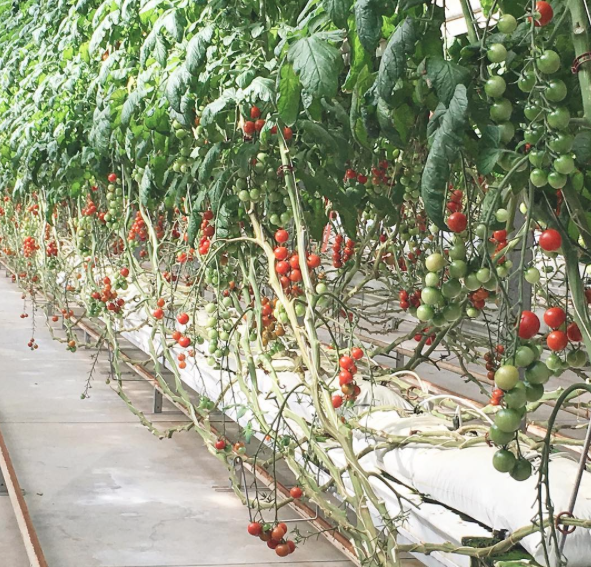

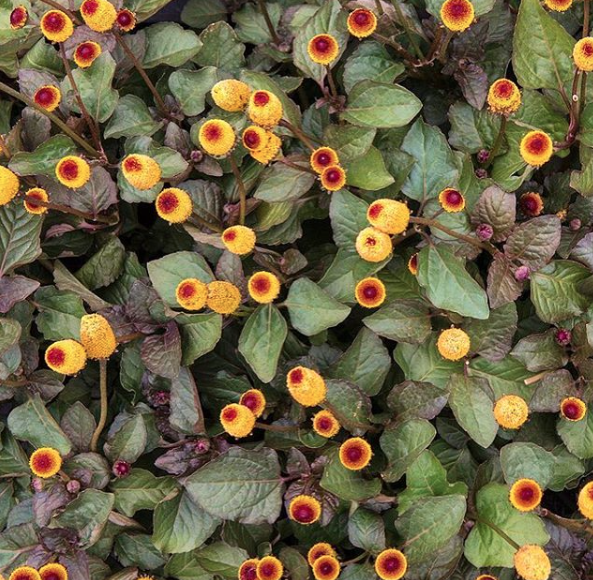
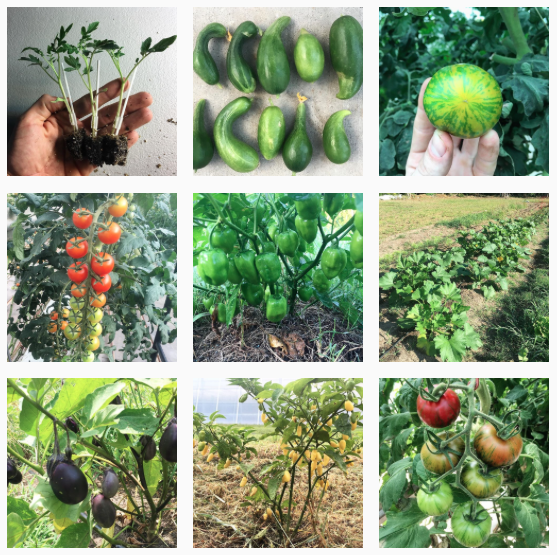






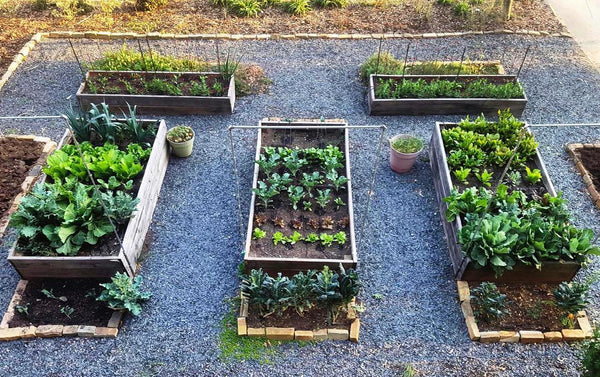







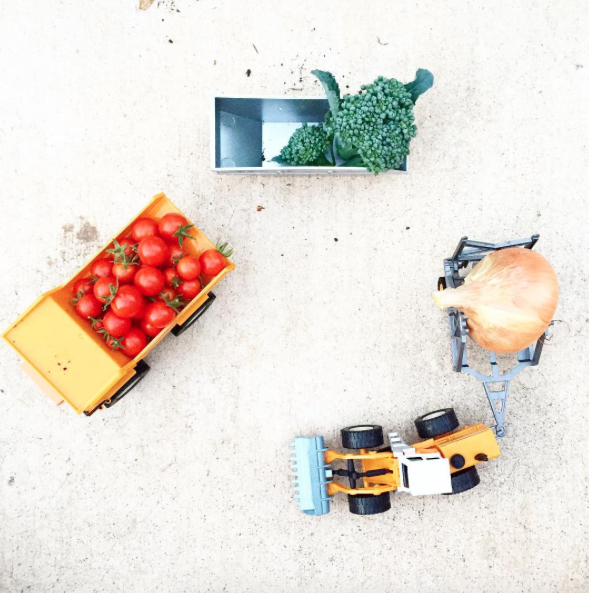

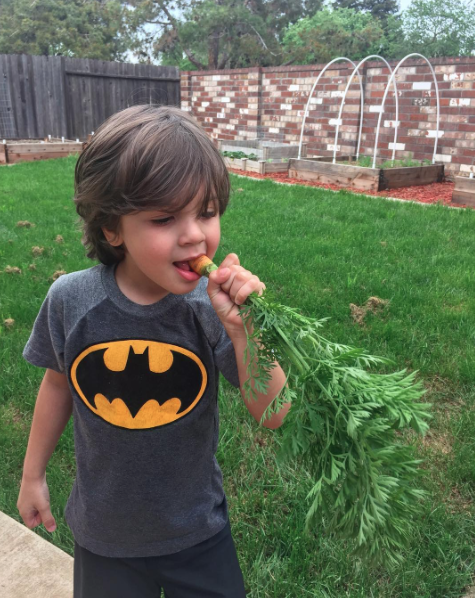
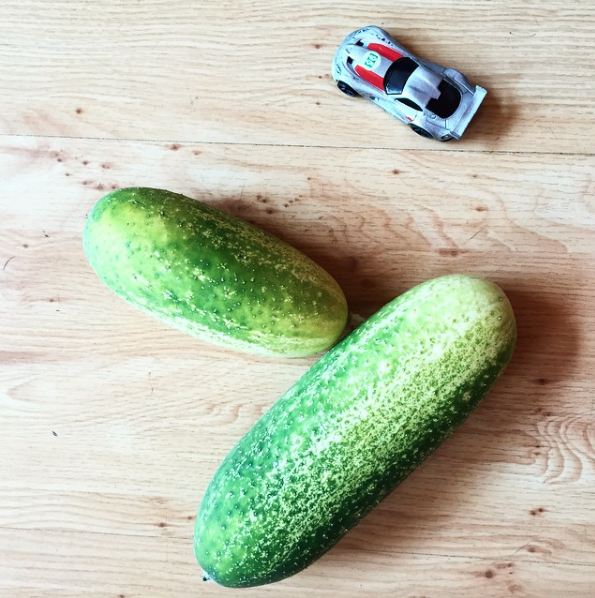
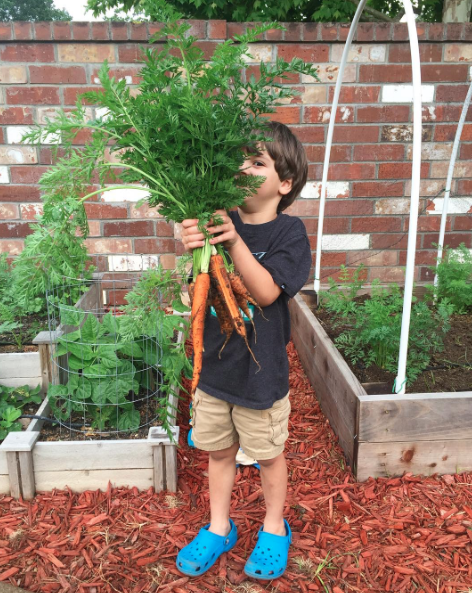

 I grew up in a military family. My mother worked all the time and didn't have much time to cook us wholesome dinners, my father being in the military didn't have much time either. So we often settled for hamburger helpers, sloppy joes, anything that was quick, easy and inexpensive!After moving out of my parents at 19 and into my first home is when the transition to this lifestyle really started. I began to like cooking and wanted to be able to walk into my own backyard and pick dinner, instead of having to drive to the grocery store and pay for it! Even with such little knowledge back then, we knew the importance of using only organic soils and seeds.
I grew up in a military family. My mother worked all the time and didn't have much time to cook us wholesome dinners, my father being in the military didn't have much time either. So we often settled for hamburger helpers, sloppy joes, anything that was quick, easy and inexpensive!After moving out of my parents at 19 and into my first home is when the transition to this lifestyle really started. I began to like cooking and wanted to be able to walk into my own backyard and pick dinner, instead of having to drive to the grocery store and pay for it! Even with such little knowledge back then, we knew the importance of using only organic soils and seeds.




 What's your favorite variety of crop to grow and why?
What's your favorite variety of crop to grow and why?




 I had to take early retirement due to medical disabilities. I needed to focus on something positive in my life, other than the chronic pain and physical limitations I was dealing with every day. So, I decided to share my passion for gardening through a website, which is now called Abundant Mini Gardens.
I had to take early retirement due to medical disabilities. I needed to focus on something positive in my life, other than the chronic pain and physical limitations I was dealing with every day. So, I decided to share my passion for gardening through a website, which is now called Abundant Mini Gardens. 


 My girls are one piece to the permaculture system I am attempting to establish. The chickens help out the garden: fertilizer, insect control, turning the dirt, mixing in compost. In turn, the garden helps the chickens: insects, garden scraps, dedicated chicken crops. Plus the garden and chickens contribute to the compost (poop and scraps), the chickens turn the compost and then the compost nourishes the soil.
My girls are one piece to the permaculture system I am attempting to establish. The chickens help out the garden: fertilizer, insect control, turning the dirt, mixing in compost. In turn, the garden helps the chickens: insects, garden scraps, dedicated chicken crops. Plus the garden and chickens contribute to the compost (poop and scraps), the chickens turn the compost and then the compost nourishes the soil. 
 around for the kids to learn about and pet. My son would not put down the little red hen! He carried it all around! Only the promise of birthday cake distracted him from this hen. The little red hen and the instant bond with my son got me thinking about backyard chicken keeping. I started my research after the party. I read everything I could get my hands on about chicks and chicken keeping. It took about 5 years before I came to a place in life that I could execute this dream of a backyard coop. Everyone thought I was crazy. I met a wonderful guy who had previous chicken experience and better carpentry skills than I. He believed in my dream and helped make it happen!
around for the kids to learn about and pet. My son would not put down the little red hen! He carried it all around! Only the promise of birthday cake distracted him from this hen. The little red hen and the instant bond with my son got me thinking about backyard chicken keeping. I started my research after the party. I read everything I could get my hands on about chicks and chicken keeping. It took about 5 years before I came to a place in life that I could execute this dream of a backyard coop. Everyone thought I was crazy. I met a wonderful guy who had previous chicken experience and better carpentry skills than I. He believed in my dream and helped make it happen!
 check your local laws. If you have a home owners association, check the rules. There is nothing worse than finding out, after investing time and money, that your hens are illegal. Also talk to and educate your neighbors! Don’t hide your chickens. Plus it is amazing how quickly minds change when offered a bribe of fresh eggs! Also, these are living, breathing, feeling creatures! With the rise of backyard chicken keeping, we are seeing a rise in abuse, neglect and abandonment of hens and especially roosters. This is a commitment! A hen lives 8-10 years on average and are typically only productive layers for 5-7 years. What are you going to do once a hen stops laying? You have to ask yourself the hard questions before taking on the responsibility of raising chickens.
check your local laws. If you have a home owners association, check the rules. There is nothing worse than finding out, after investing time and money, that your hens are illegal. Also talk to and educate your neighbors! Don’t hide your chickens. Plus it is amazing how quickly minds change when offered a bribe of fresh eggs! Also, these are living, breathing, feeling creatures! With the rise of backyard chicken keeping, we are seeing a rise in abuse, neglect and abandonment of hens and especially roosters. This is a commitment! A hen lives 8-10 years on average and are typically only productive layers for 5-7 years. What are you going to do once a hen stops laying? You have to ask yourself the hard questions before taking on the responsibility of raising chickens. Do not underestimate how many chickens you will adopt and how much space they need. There is a quote going around “People thought I was crazy building a chicken coop. They were right, I should have built two!” Chickens are addictive (again, check your local laws as to how many chickens you are allowed)! I started of with a respectable size coop. Then I added a 4x10 run. And now I have a 10 ft x 20 ft protected chicken yard. All this is in addition to letting the girls free range in the afternoon and evening. A small hobby has turned into a chicken complex. Remember that overcrowding leads to bullying, feather picking and unsanitary conditions.
Do not underestimate how many chickens you will adopt and how much space they need. There is a quote going around “People thought I was crazy building a chicken coop. They were right, I should have built two!” Chickens are addictive (again, check your local laws as to how many chickens you are allowed)! I started of with a respectable size coop. Then I added a 4x10 run. And now I have a 10 ft x 20 ft protected chicken yard. All this is in addition to letting the girls free range in the afternoon and evening. A small hobby has turned into a chicken complex. Remember that overcrowding leads to bullying, feather picking and unsanitary conditions.
 Have you ever dealt with a person who disregards your life style?
Have you ever dealt with a person who disregards your life style? My suburban micro farm is a work in
My suburban micro farm is a work in


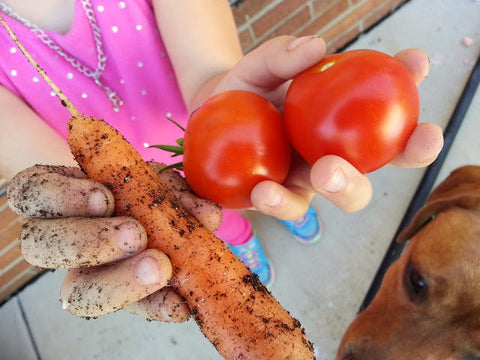

 My goals for the future are to make MI OFO a household name. I have been pairing Veterans with the ATI program that reach out to me on our outings. Many Veterans have met my dog, and had questions in regards to obtaining a dog. I have helped pair 4 Veterans with service dogs with no cost to them. My partnership with Stiggys Dogs out of Howell Mi, has been amazing. I thank them everyday for my right hand man Baxter.
My goals for the future are to make MI OFO a household name. I have been pairing Veterans with the ATI program that reach out to me on our outings. Many Veterans have met my dog, and had questions in regards to obtaining a dog. I have helped pair 4 Veterans with service dogs with no cost to them. My partnership with Stiggys Dogs out of Howell Mi, has been amazing. I thank them everyday for my right hand man Baxter. 




 ed in the Philippines when I was a young and we had fruit trees where we lived, such as mangoes, guavas, bananas and coconuts. We enjoyed eating fresh picked fruits. When we moved to the United States, my mother started a small vegetable garden. We also had blackberry bushes that grew wildly, every summer we would pick the berries and sometimes our mother made blackberry jam. In the summers, we also picked blueberries to earn money for school, we were paid by the flat. These experiences and memories inspired me to garden organically, especially during these times, of how conventional food is mass produced. I also wanted to instill these lessons to my own children so they can pass it on for generations.
ed in the Philippines when I was a young and we had fruit trees where we lived, such as mangoes, guavas, bananas and coconuts. We enjoyed eating fresh picked fruits. When we moved to the United States, my mother started a small vegetable garden. We also had blackberry bushes that grew wildly, every summer we would pick the berries and sometimes our mother made blackberry jam. In the summers, we also picked blueberries to earn money for school, we were paid by the flat. These experiences and memories inspired me to garden organically, especially during these times, of how conventional food is mass produced. I also wanted to instill these lessons to my own children so they can pass it on for generations.
 ed in the Philippines when I was a young and we had fruit trees where we lived, such as mangoes, guavas, bananas and coconuts. We enjoyed eating fresh picked fruits. When we moved to the United States, my mother started a small vegetable garden. We also had blackberry bushes that grew wildly, every summer we would pick the berries and sometimes our mother made blackberry jam. In the summers, we also picked blueberries to earn money for school, we were paid by the flat. These experiences and memories inspired me to garden organically, especially during these times, of how conventional food is mass produced. I also wanted to instill these lessons to my own children so they can pass it on for generations.
ed in the Philippines when I was a young and we had fruit trees where we lived, such as mangoes, guavas, bananas and coconuts. We enjoyed eating fresh picked fruits. When we moved to the United States, my mother started a small vegetable garden. We also had blackberry bushes that grew wildly, every summer we would pick the berries and sometimes our mother made blackberry jam. In the summers, we also picked blueberries to earn money for school, we were paid by the flat. These experiences and memories inspired me to garden organically, especially during these times, of how conventional food is mass produced. I also wanted to instill these lessons to my own children so they can pass it on for generations.






 There is likely nothing better than raising a seed all the way to harvest. It’s about as cool as it gets for me knowing I took care of this correctly and now it is providing me with health.
There is likely nothing better than raising a seed all the way to harvest. It’s about as cool as it gets for me knowing I took care of this correctly and now it is providing me with health.
 th dolphins and manatees. I can say that I actually did get to experience my dream but chose another.
th dolphins and manatees. I can say that I actually did get to experience my dream but chose another.


 you have radishes below your beans and your beans below your tomatoes! Spacing was largely decided upon for big farms to have room for tractors to come through and perform necessary operations without disturbing soils and plants. You have your hands not a tractor - fill spaces in! Tomatoes tend to want lots of space but basil don’t mind bunching so fill in the gaps between plants.
you have radishes below your beans and your beans below your tomatoes! Spacing was largely decided upon for big farms to have room for tractors to come through and perform necessary operations without disturbing soils and plants. You have your hands not a tractor - fill spaces in! Tomatoes tend to want lots of space but basil don’t mind bunching so fill in the gaps between plants.
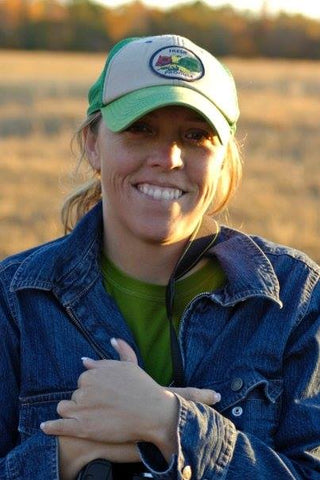 I did start blogging around the same time that I transitioned to a more self-sufficient and healthy lifestyle. I had been a vegetarian for 25+ years but never really attempted to grow my own food. My first attempt at gardening was such a great learning experience. It was filled with so many opportunities to learn and grow. That first season had so many ups and downs, but was worth every bit of frustration as the knowledge I gained is invaluable. I became so passionate about growing food, I wanted to share it with everyone I could.
I did start blogging around the same time that I transitioned to a more self-sufficient and healthy lifestyle. I had been a vegetarian for 25+ years but never really attempted to grow my own food. My first attempt at gardening was such a great learning experience. It was filled with so many opportunities to learn and grow. That first season had so many ups and downs, but was worth every bit of frustration as the knowledge I gained is invaluable. I became so passionate about growing food, I wanted to share it with everyone I could.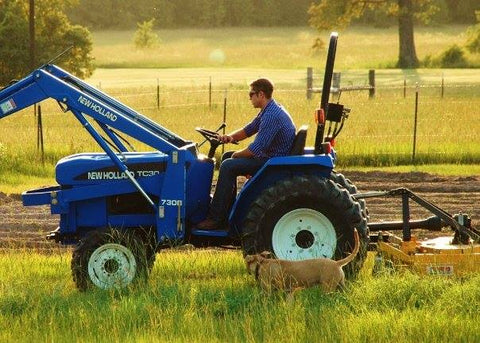 my parents and I lived on my grandpa’s farm in Phoenix, AZ. There he raised cattle, chickens, pigs and always had a plethora of vegetables and fruits growing each season. This was my very first experience to a more self-sufficient lifestyle. I have very vivid memories of days spent in the garden harvesting whatever he was growing and evenings spent enjoying the food we had harvested earlier in the day. I remember being a little girl and thinking that this lifestyle was what I wanted to live. Fast forward many years later to a time that I found myself ready to start an entirely new life that was centered on being more self-sufficient and being more aware of where our food was coming from. It literally was a lightbulb moment for me. I remember sitting at work and suddenly thinking to myself it was time to make a drastic change… and so I did. My passion for growing our own healthy, organic food was truly sparked after I saw the excitement in my family’s eyes as they would see me bringing in food to be served that was just harvested from the garden. There’s nothing quite like homegrown goodness cultivated from hard work and love.
my parents and I lived on my grandpa’s farm in Phoenix, AZ. There he raised cattle, chickens, pigs and always had a plethora of vegetables and fruits growing each season. This was my very first experience to a more self-sufficient lifestyle. I have very vivid memories of days spent in the garden harvesting whatever he was growing and evenings spent enjoying the food we had harvested earlier in the day. I remember being a little girl and thinking that this lifestyle was what I wanted to live. Fast forward many years later to a time that I found myself ready to start an entirely new life that was centered on being more self-sufficient and being more aware of where our food was coming from. It literally was a lightbulb moment for me. I remember sitting at work and suddenly thinking to myself it was time to make a drastic change… and so I did. My passion for growing our own healthy, organic food was truly sparked after I saw the excitement in my family’s eyes as they would see me bringing in food to be served that was just harvested from the garden. There’s nothing quite like homegrown goodness cultivated from hard work and love. First and foremost, I would like others to know that there is nothing like growing your own food! It is so rewarding! It feels so great to know that we have the ability to provide for our family and that we do not have to depend on anyone (or any store) to do so.
First and foremost, I would like others to know that there is nothing like growing your own food! It is so rewarding! It feels so great to know that we have the ability to provide for our family and that we do not have to depend on anyone (or any store) to do so. I think one of the biggest things I would share with others is to remember that starting a life of being more self-sufficient is that it is a process, not an event. It is not something that you can jump into in one single day and have it done perfectly right out of the gate. It is many days of trying to do a bit better than the day before and building upon knowledge that you are learning. As you try new things whether you are learning a new skill, getting dirty in the garden or building a new project that is challenging you, just remember to enjoy the journey and keep it fun! After all, if you are not enjoying whatever it is you are doing, why are you still doing it? Don’t get me wrong, some tasks on the farm are not totally enjoyable, but I do try to still have fun while doing them.
I think one of the biggest things I would share with others is to remember that starting a life of being more self-sufficient is that it is a process, not an event. It is not something that you can jump into in one single day and have it done perfectly right out of the gate. It is many days of trying to do a bit better than the day before and building upon knowledge that you are learning. As you try new things whether you are learning a new skill, getting dirty in the garden or building a new project that is challenging you, just remember to enjoy the journey and keep it fun! After all, if you are not enjoying whatever it is you are doing, why are you still doing it? Don’t get me wrong, some tasks on the farm are not totally enjoyable, but I do try to still have fun while doing them.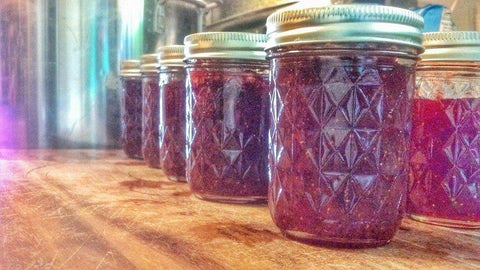 instance, this past year I set out to learn how to make homemade jam from the fruits we are growing here on our farm. It was so lovely having a pantry full of delicious homemade jam to use and to give away to friends. I also decided that I wanted to learn to make homemade soap, delicious homemade pies and how to preserve and can our food that we are growing. I took on all of those challenges and ended up becoming pretty proficient at them. When I first learned to do canning,
instance, this past year I set out to learn how to make homemade jam from the fruits we are growing here on our farm. It was so lovely having a pantry full of delicious homemade jam to use and to give away to friends. I also decided that I wanted to learn to make homemade soap, delicious homemade pies and how to preserve and can our food that we are growing. I took on all of those challenges and ended up becoming pretty proficient at them. When I first learned to do canning,  Oh yes! I have made plenty of mistakes and have failed at multiple things while following this journey. I do believe that it is in those teachable moments that I can grow as an individual. Many of my failures on the farm have created opportunities to slow down, re-evaluate and figure out another method of completion of the project at hand. One year we had a freak ice storm late in the spring that took out our entire garden in one swoop and boy was I mad, sad, frustrated and bewildered all at once.
Oh yes! I have made plenty of mistakes and have failed at multiple things while following this journey. I do believe that it is in those teachable moments that I can grow as an individual. Many of my failures on the farm have created opportunities to slow down, re-evaluate and figure out another method of completion of the project at hand. One year we had a freak ice storm late in the spring that took out our entire garden in one swoop and boy was I mad, sad, frustrated and bewildered all at once. Have you ever dealt with a person who disregards your life style?
Have you ever dealt with a person who disregards your life style? 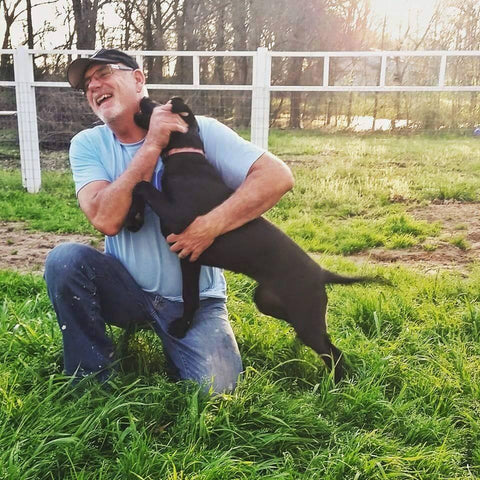 Our biggest goal from the beginning when my husband and I started dreaming about creating this kind of life was simple- we simply wanted a healthier more self-sufficient lifestyle. We wanted to grow our own food, preserve and can what we could and live a life that had more meaning. We really wanted to slow down, take a deep breath and enjoy the rural lifestyle with our family and friends. The greatest reward so far is seeing our farm guests get excited about being on our farm and heading straight out to the gardens to see what is growing. They love helping to harvest veggies and fruits and they all especially love the garden to table experience as well.
Our biggest goal from the beginning when my husband and I started dreaming about creating this kind of life was simple- we simply wanted a healthier more self-sufficient lifestyle. We wanted to grow our own food, preserve and can what we could and live a life that had more meaning. We really wanted to slow down, take a deep breath and enjoy the rural lifestyle with our family and friends. The greatest reward so far is seeing our farm guests get excited about being on our farm and heading straight out to the gardens to see what is growing. They love helping to harvest veggies and fruits and they all especially love the garden to table experience as well.